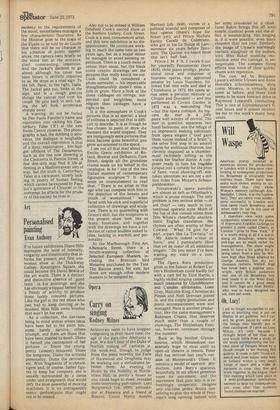Op e ra
Carry on singing
Rodney %Ines
Aristocrats seem to have stopped composing in their spare time; the age of the part-time dilettante is past .We don't hear of the Duke of Norfolk tossing off cantatas at the week-end, though to judge from the press recently the Earls of Harewood and Drogheda may be working out a melodrama between them. An evening of Music by the Nobility at Hintlesham Hall, as pretty a house as you could hope to meet, revealed some interesting part-timers: Lord Burghersch (ob. 1859), ambassador at Florence and a friend of Rossini; Count Marco Aurelio Marliani (ob. 1849), victim of a political scandal and composer of four operas (there's hope for Nixon yet); and Prince Michele Enrico Carafa de Coldbrano, who got in his Le Nozze di Lammermoor six years before Donizetti. The Quintet we heard from this isn't half bad.
Prince J. M. F. X. J. (work it out for yourself) Poniatowski (born 1816), child piano prodigy, professional tenor and composer of fourteen operas, was appointed senator by Louis Napoleon, followed him into exile and died at Chislehurst in 1873. His opera serias seem a peculiar mixture of Chopin and Donizetti — and one performed at Covent Garden in 1873 was a resounding flop —but this opera comique, Au truvers du mur is a jolly piece well worthy of revival. The mur in question separates two hotel bedrooms, one the refuge of an impresario seeking sanctuary from opera singers (" God gave them voices instead of a brain "), the other first step in an assault course for ambitious chorines, one cleverly disguised as a chambermaid recklessly trilling as she wields her feather duster. A composer ready to turn his tragedie lyrique into a comedy for the price of fame, vocal showing-off, mistaken identities: we are not a million miles from Mozart's Schauspieldirech tor.
Poniatowski's opera parodies are almost as deft as Offenbach's, which is praise enough. The only problem is two serious arias — or are they? — very much in conventional operatic style. Much of the fun of this version stems from DOn White's cheerfully anachronistic F.nglish translation. His rhymes are often worthy of Noel Coward: "What I'd give for a part, a/part like La Traviata," or "My Aida/is indeed a/tour de force," and I particularly liked that cri de coeur of all ambitious singers: "Do you mean I've been wasting my voice on a composer?"
The Opera Rara production given in the Saloon at Robert Carrier's Hintlesham could hardly fail with a cast led by Enid Hartle, a highly skilled singing comedienne much treasured by Glyndebourne and Camden aficionados. Lissa Gray, Malcolm King, Christian du Plessis and Noel Drennan joined in, and the simple production and piano accompaniment were well managed. Here is another produc
tion, like the same management's Robinson Crusoe, that deserves
much more than a couple of showings. The Hintlesham Festival, however, continues through the summer.
Back at big brother Glynde bourne, which Hintlesham can scarcely hope to rival until its open-air theatre is rebuilt, Peter
Hall has revived last year's version of Monteverdi's Ulisse. It
remains a model of operatic pro duction. John Bury's spacious, beautifully lit set allows generous room for movement, and the
movement Hall puts into it is refreshingly unoperatic. Imagine any old-time prima donna consenting to play the whole of Pene.lope's long opening lament with
her arms concealed in a cloak. Janet Baker brings this off with. simple, classical poise and the effect is mesmerising. Her singing is, if it were possible, even more eloquent than last year. Similarly the image of Ulysse's alarmingly realistic slaughter of the suitors, with Miss Baker standing motionless amid the carnage, is untorgettable. The complex flying effects lose none of their quirky charm with repetition.
The cast, led by Benjamin Luxon's athletic Ulysses and Anne Howells's schoolmistressy, slyly comic Minerva, is virtually the same as before, and there no seems to be more forward drive in Raymond Leppard's conducting. This is one of Glyndebourne's finest hours and it almost reconciles me to the work's many longueurs.


































 Previous page
Previous page